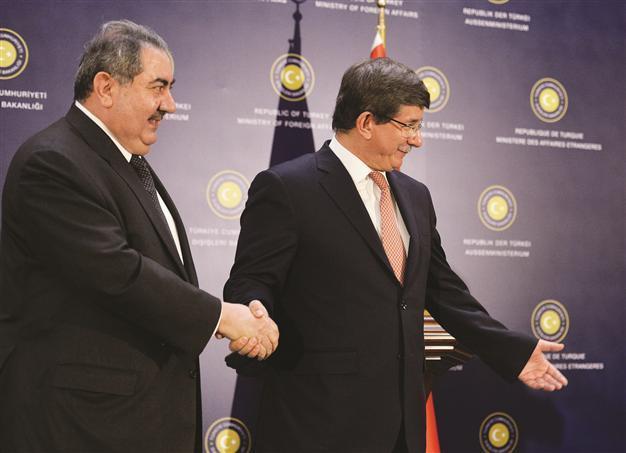Turkey and Iraq work to repair bilateral ties
ANKARA - Hürriyet Daily News

Iraqi Foreign Minister Zebari (L) was recently in Turkey and is expected to meet Davutoğlu in Baghdad soon. DAILY NEWS photo, Selahattin SÖNMEZ
After nearly two year of cold ties, Turkey and Iraq are intensifying talks to repair bilateral relations, as Turkish Foreign Minister Ahmet Davutoğlu is set to visit Baghdad on Nov. 10.
Davutoğlu is expected to meet the Iraqi Prime Minister Nouri al-Maliki and Foreign Minister Hosyhar Zebari along with other high-level Iraqi officials in a visit only weeks after Zebari held talks in Ankara. Al-Maliki’s visit to Ankara in the coming months is also on the agenda, but the final date has not been set yet.
Turkey contributed most to democratization“It was Turkey who made the most contribution to the democratization process of Iraq,” Davutoğlu said in a televised interview on Nov. 8, referring to the developments in this neighboring country following elections in 2006.
Davutoğlu described the current chilliness in bilateral ties as conjectural and pointed out the internal tension in Iraq as the primary reason of ruined Ankara-Baghdad relations.
“(Internal tension) had not only effects on us but on the entire region. The political principle we are pursuing here is to allow a political process that will embrace all segments,” Davutoğlu stressed.
Turkey never tried to intervene with the internal affairs of its neighbors, he said, but adding that developments in regional countries affect other countries.
“It’s particularly much more visible in the frame of Iraq and Syria,” he said.
Davutoğlu’s visit comes only days after reports suggested Turkey and Iraqi Kurdistan Regional Government (KRG) agreed on a comprehensive energy deal that includes oil, natural gas licenses and a pipeline to carry them from northern Iraq to Turkey. The deal is seen as controversial as the Iraqi central government and the regional government has not yet resolved their problem in sharing revenues.
“None of the (prepared) agreements ignore the rights of the central government or erode the central government’s legal and constitutional rights. Afterwards, we will discuss all of these things (with Iraq),” Davutoğlu underlined.
The Turkish foreign minister also stressed Turkey’s policy was to be interested in the whole of Iraq’s energy resources, not to only focus on those of northern Iraq, stating that transporting Iraqi sources through Turkey was in fact to the interest of Iraqi people.
Ties with IsraelOn ties with Israel, recalling that some Israeli officials admitted Israel was wrong in attacking the Gaza-bound Mavi Marmara vessel and killing unarmed civilians, Davutoğlu said it was important that Israelis were examining their acts through these sorts of statements.
“This would mean that Israel has learned its lesson out of this issue and will not to repeat the same mistakes,” the foreign minister said. An Israeli former military intelligence chief recently admitted that what happened in the Mavi Marmara raid was a big mistake.
Retired Maj. Gen. Amos Yadlin was the chief of the military intelligence during the deadly raid in 2010 that killed nine Turkish citizens on board. “What happened with Mavi Marmara was a great mistake. Both Israel and Turkey made mistakes and I wish those incidents did not happen,” Yadlin told Anadolu Agency.
When asked if he would act the same if the incident happened today, he said: “With these experiences, those incidents would not happen today.”
